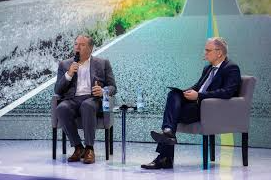The Singaporean Minister underscores the transformative potential of AI and the importance of equipping workers for the future.
Manpower Minister Tan See Leng delivered a compelling address at the 53rd St Gallen Symposium in Switzerland on May 2, stressing that those who embrace artificial intelligence (AI) and technology will outpace those who don’t. His remarks reflect Singapore’s forward-looking commitment to innovation and workforce development, as reported by The Straits Times.
Dr. Tan announced Singapore’s plan to invest $1 billion over the next five years into its national AI strategy, aiming to foster industry growth and equip individuals with essential skills. He emphasized Singapore’s workforce as the nation’s “singular resource,” highlighting government initiatives to ensure equal opportunities for all workers.
“No one can guarantee equal outcomes, but we can level the playing field for everyone from the start,” Dr. Tan stated.
Singapore has launched initiatives to prepare its workforce for the AI revolution. Collaborative efforts with companies are driving the establishment of AI centres of excellence. Universities, polytechnics, and the Institute of Technical Education are incorporating AI courses to enhance students’ technological capabilities.
To address manpower constraints, Singapore has also invested in lifelong education and international talent acquisition. Programs like subsidized education from early childhood to postgraduate levels and the Overseas Networks and Expertise Pass aim to nurture homegrown talent and attract top-tier global professionals.
Speaking alongside Dr. Tan, Mr. Peter Voser, chairman of ABB and Singapore’s PSA, echoed the importance of investing in both technology and human resources. He emphasized that automation and robotics complement the workforce rather than displace it, citing PSA’s automated Tuas Port as a case study. Workers there have been re-trained for roles in advanced control rooms, reflecting the shift towards skill evolution rather than job loss.
“Automation and robotics won’t replace people. They will create new roles requiring different skills,” Mr. Voser said, debunking fears surrounding workforce automation.
The symposium closed with a thought-provoking question from audience member Mr. Praghav Arora, who asked about the ultimate purpose of innovation in an era of constant technological advancement.
“Are we blindly racing to innovate simply because others are doing so? What’s the end goal of innovation?” he queried.
Dr. Tan responded that innovation’s true value lies in building a better foundation for future generations.
“You are paving the way for those who come after you to achieve even greater things,” he remarked, underscoring the enduring legacy of progress.








